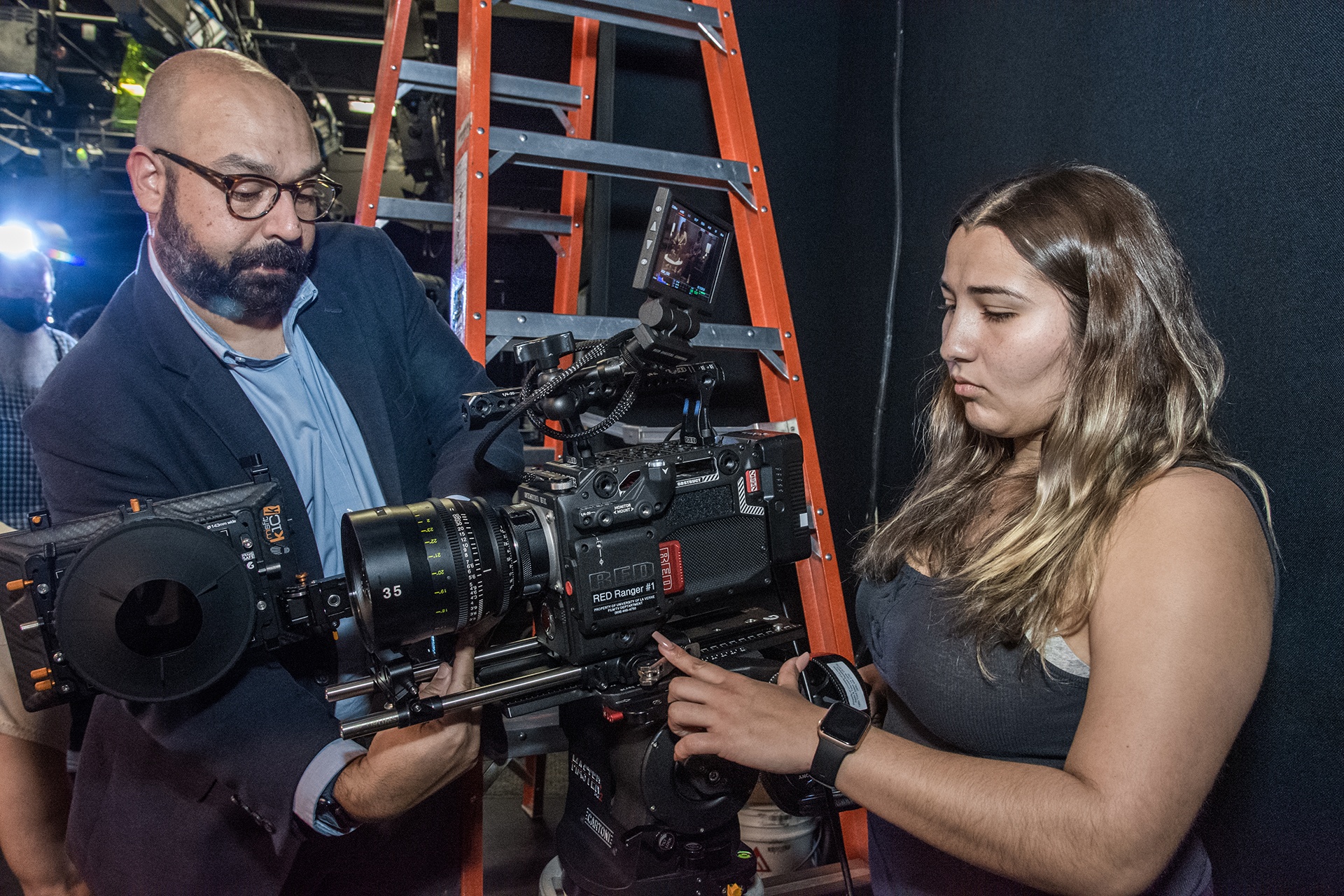In Focus
Students in the digital media program leverage their talents to help nonprofits in need of professional—and compelling—videography work.
June 6, 2022
There’s hesitation in the knock on the apartment door of Johnpaul Ortiz ’24. He opens it to find Brian Duenas Sanchez ’24, a mixture of defeat and exhaustion on his face. No familiar handshake or warm pleasantries are exchanged; Brian simply pushes past his friend and slumps onto a nearby couch.
Johnpaul sits across from him. “What’s going on?” he asks. “Did you and Sarah get in another fight?”
A beat. “Yeah, it’s getting bad,” Brian confesses. “I don’t know how much more I can take.”
While the situation isn’t real to them—both students are performing for the camera—the scenario is all too familiar for the clients of the Los Angeles Domestic Violence Council. And that’s the point; the short film on spousal mediation was produced by the University of La Verne’s digital media program to help people navigate the legal system in times of crisis. Last fall, more than a dozen students created a series of videos to provide resources to the nonprofit while giving students the opportunity to commit socially-conscious projects to film.
“The council is always trying to find ways to simplify things for their clients, who are victims of domestic violence,” said Morgan Sandler, associate professor and chair of the digital media program. “So we were asked to put together instructional videos to help navigate the different processes they’re going to see.”
Sandler was introduced to the council’s efforts through Sherri Mylott, vice president for University Advancement. From there, he worked with students in the University of La Verne’s Fundamentals of Video Production class to craft the first wave of videos.
“Students acted in them, wrote the scripts, and directed them,” Sandler said. “They were the cinematographers, the producers. They took on all aspects of the project.”
To get an authentic feel for the subject matter, students coordinated with council attorneys to ensure scenarios were handled respectfully. The end results are stories, shared with people experiencing the same universal emotions played out on screen. Instead of brochures or dry statistics, council clients learn about mediation, legal rulings, and more through the characters.
“It was such a privilege to work with the council,” said Kaitlyn Moran ’24, one of the student editors. “They were excited to see what we could put together and we loved working with them.”
“I believe our videos will have an impact,” added cinematographer Brett Hoyle ’25. “We show people how easy it can be to get help if you are not sure what to do in hard situations.”
“We’ve never done anything for an actual client like this before,” added Sandler. “It’s been fantastic.”
It’s also an idea he’s been cultivating for some time. The digital media program historically produces Making a Difference, a series of short-form documentaries about people in the local community. By working with the council, University of La Verne students continue this tradition while showcasing their skills across the broader region. This could be the beginning of something transformative for the department while still aligning with the university’s mission of service.
“There’s an organization called The Lucky Few, run by Heather and Josh Avis, who are incredible advocates for the Down syndrome community,” said Sandler. “They do wonderful work and are working on a project titled This is Down Syndrome. Currently it’s photographs and stories, profiling families and their struggles – and wins! However, we are soon transitioning into short films, profiling these incredible families.”
The videos form the backbone of this year’s Intermediate Video Production course. Sandler has worked for several years to build these ties and create a diverse space in the program, with offering more to the community part of the larger strategic goal.
“I want to make sure there’s a space where we can tell stories,” he said. “But I also think it’s really important we give back. Ultimately, as filmmakers, we have the opportunity to reach lots of people. Expressing those voices and those opinions to me is extremely important.”
With one academic year’s worth of material in the can, Sandler hopes to continue this with other nonprofits in the area. As a working cinematographer for more than two decades, he sees this as an opportunity to help students understand that why films are made is as important as how they’re made.
Thanks to a friendship with alumnus Nathan Chow, MS ’01, DPA ’11, who recently donated $2 million to support the university’s digital media program, Sandler is now able to teach both with state-of-the-art equipment like ARRI Alexa cameras and DaVinci Resolve color grading software.
Sandler is extremely excited about the evolution of the program; over the past six years it has transformed from a traditional television broadcasting program to a top-notch film program, with state-of-the-art technology, equipment, and curriculum. Film crews looking to shoot at University of La Verne now also hire students as production interns to help build ties with the professional community. “Our students don’t look like students at a lot of other university film programs, which is what makes our program so wonderful. There are also lots of worthwhile organizations that don’t have funding to make films,” he said.
“It’s important to me that all of their voices are heard.”
Lights. Cameras. Action.
